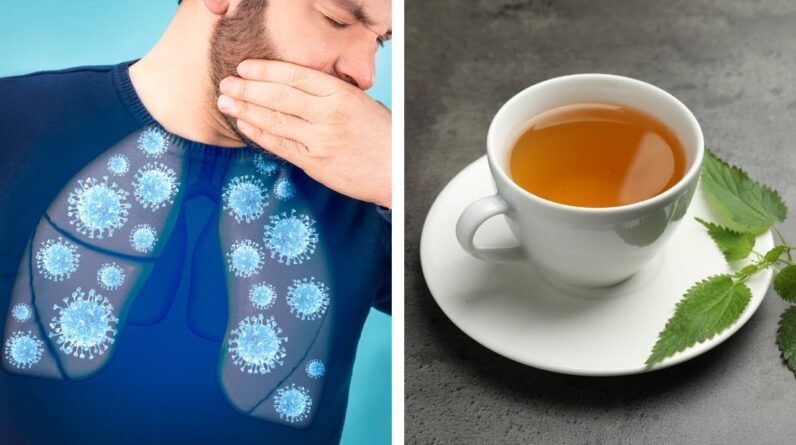
Are you looking for a simple and natural way to improve your health? Look no further than nettle tea! This humble herbal infusion has been praised for its incredible array of benefits, ranging from relieving allergies and reducing inflammation to promoting healthy skin and hair. Packed with essential vitamins, minerals, and antioxidants, nettle tea is a true powerhouse that can boost your overall well-being. Join us as we explore the amazing benefits of nettle tea and discover why this herbal beverage deserves a place in your daily routine. So sit back, relax, and prepare to be amazed!

Table of Contents
Overview of Nettle Tea
What is Nettle Tea?
Nettle tea is a herbal beverage made from the leaves and stems of the common nettle plant, scientifically known as Urtica dioica. This versatile tea has a long history of use in traditional medicine and is renowned for its numerous health benefits. The tea is often brewed by infusing the dried nettle leaves in hot water, resulting in a soothing and aromatic drink that can be enjoyed throughout the day.
Traditional Uses of Nettle Tea
Nettle tea has been used for centuries in various traditional medicinal practices around the world. In ancient times, it was valued for its ability to relieve pain and inflammation, support joint health, and promote overall well-being. Many cultures have also recognized nettle tea as a natural remedy for a wide range of ailments, including allergies, urinary tract issues, and menstrual discomfort. Today, nettle tea continues to be highly regarded for its therapeutic properties and is enjoyed by countless individuals seeking natural remedies for their health concerns.
Cultural Significance of Nettle Tea
Beyond its medicinal uses, nettle tea holds cultural significance in many regions. In some countries, like India, nettle tea is consumed as part of traditional Ayurvedic practices, believed to restore balance and promote overall health. In European folklore, nettle tea is regarded as a symbol of good luck and is often considered a protective brew against evil spirits. Regardless of the cultural beliefs associated with it, nettle tea serves as a comforting and beneficial beverage that can be enjoyed by people from all walks of life.
Nutritional Profile of Nettle Tea
Vitamins and Minerals
Nettle tea is a nutritional powerhouse, brimming with an array of essential vitamins and minerals. It is a rich source of vitamins A, C, and K, which are known for their antioxidant properties and their role in supporting a healthy immune system. Additionally, nettle tea contains minerals such as iron, magnesium, calcium, and potassium, among others, which play vital roles in maintaining optimal bodily functions.
Antioxidants
One of the key components that make nettle tea so beneficial for health is its high antioxidant content. Antioxidants help neutralize harmful free radicals in the body, reducing oxidative stress and protecting against chronic diseases. Nettle tea contains various antioxidants, such as flavonoids, carotenoids, and phenolic compounds, which contribute to its potent antioxidant activity.
Polyphenols
Polyphenols are a group of compounds found in plants that provide numerous health benefits. Nettle tea is particularly abundant in polyphenols, which have been shown to have anti-inflammatory, anticancer, and antimicrobial properties. Regular consumption of nettle tea can help fortify the body’s defense mechanisms and support overall well-being.
Health Benefits of Nettle Tea
Anti-inflammatory properties
Nettle tea has long been celebrated for its potent anti-inflammatory properties. The presence of active compounds like quercetin and kaempferol in nettle leaves contributes to its ability to alleviate inflammation in the body. Regular consumption of nettle tea may help reduce the risk of chronic inflammation-related diseases, such as arthritis, asthma, and inflammatory bowel diseases.
Allergy relief
Nettle tea is a natural remedy that has been traditionally used to alleviate allergy symptoms. It contains natural antihistamines that can help reduce the body’s allergic response, providing relief from symptoms such as sneezing, itching, and congestion. Many individuals find relief from seasonal allergies by incorporating nettle tea into their wellness routine.
Urinary tract health
Nettle tea has diuretic properties, which means it can help increase urine production and promote urinary tract health. It may aid in the prevention and management of urinary tract infections, as well as supporting the overall health of the kidneys and bladder. Nettle tea’s diuretic effect also helps flush out toxins from the body, promoting overall detoxification.
Blood sugar control
Research suggests that nettle tea may help regulate blood sugar levels, making it beneficial for individuals with diabetes or those at risk of developing the condition. The compounds found in nettle leaves help enhance insulin sensitivity and lower blood glucose levels. Regular consumption of nettle tea, in conjunction with a balanced diet and lifestyle, may contribute to improved blood sugar control.
Digestive aid
Nettle tea has been traditionally used as a digestive aid, as it can help stimulate the production of digestive enzymes and improve overall gut health. It may alleviate digestive issues such as indigestion, bloating, and constipation. Nettle tea’s natural anti-inflammatory properties may also help soothe the gastrointestinal tract and ease gastrointestinal discomfort.
Joint and muscle health
The anti-inflammatory properties of nettle tea make it a popular choice for supporting joint and muscle health. Regular consumption of nettle tea may help alleviate symptoms of arthritis, such as joint pain and stiffness. It is believed to reduce inflammation in the joints and improve overall joint mobility.
Skin health
Nettle tea is often touted for its skin-enhancing properties. Its antioxidant content can help protect the skin from damage caused by free radicals, preventing premature signs of aging and supporting a healthy complexion. Nettle tea can also be applied topically to the skin to soothe irritations, such as rashes, eczema, or acne.
Hair and Scalp Health
Stimulates hair growth
Nettle tea has been used for centuries as a natural hair growth stimulant. Its rich nutrient composition, particularly high levels of vitamins A and C, helps nourish the scalp and promote hair growth. Regularly rinsing the hair with nettle tea or incorporating it into hair care routines can lead to stronger, healthier-looking hair.
Reduces dandruff
Dandruff is a common scalp condition characterized by dry, flaky skin. Nettle tea’s antifungal and anti-inflammatory properties can help combat dandruff and reduce scalp irritation. Using nettle tea as a hair rinse or applying it topically to the scalp may help alleviate dandruff and restore scalp health.
Promotes scalp health
Nettle tea’s natural astringent properties can help regulate sebum production, thereby promoting a healthy scalp. It may help balance oil levels on the scalp, reducing greasiness while keeping the scalp properly moisturized. Nettle tea’s scalp-nourishing properties can also contribute to a reduced risk of scalp conditions like itchiness and scalp odor.
Supports Cardiovascular Health
Reduces high blood pressure
Regular consumption of nettle tea may contribute to reduced blood pressure levels. Nettle tea acts as a natural diuretic, helping eliminate excess fluids from the body and lowering blood pressure. Its potassium content also plays a role in maintaining a healthy blood pressure range.
Improves blood circulation
Nettle tea is believed to improve blood circulation, which is essential for a healthy cardiovascular system. Improved blood flow helps deliver oxygen and nutrients to all parts of the body, promoting overall cardiovascular health and reducing the risk of conditions such as heart disease and stroke.
Lowers cholesterol levels
Nettle tea has shown promise in helping lower LDL cholesterol levels, often referred to as “bad” cholesterol. The presence of plant sterols in nettle leaves has been associated with a reduction in cholesterol absorption, contributing to healthier cholesterol levels. By incorporating nettle tea into a heart-healthy diet, individuals may support their cardiovascular health and reduce their risk of developing cardiovascular diseases.
Boosts Immune System
Enhances immune response
Nettle tea’s high vitamin C content helps support a healthy immune system. Vitamin C is known to boost immune function, playing a vital role in the body’s defense against infections and illnesses. Regular consumption of nettle tea may enhance the immune response and reduce the duration and severity of common colds and other respiratory infections.
Fights against infections
Nettle tea possesses antimicrobial properties that help combat various pathogens, including bacteria and fungi. Its ability to fight against infections makes it a valuable beverage for maintaining general wellness. Incorporating nettle tea into one’s diet can help fortify the body’s natural defense mechanisms and protect against microbial invaders.
Weight Loss Aid
Boosts metabolism
Nettle tea has been recognized for its potential as a weight loss aid due to its ability to boost metabolism. The compounds found in nettle leaves can help increase metabolic rate, leading to more efficient calorie burning. Combined with a balanced diet and regular physical activity, nettle tea may assist in weight management efforts.
Curbs appetite
Nettle tea’s natural diuretic properties may help reduce feelings of bloating and gently suppress the appetite. By promoting a reduced water retention and providing a gentle sense of fullness, nettle tea can aid in curbing cravings and support individuals in achieving their weight loss goals.
Aids in Menstrual Issues
Relieves menstrual cramps
Nettle tea has been used traditionally to relieve menstrual cramps and discomfort associated with the menstrual cycle. Its natural anti-inflammatory properties help reduce inflammation in the uterus, alleviating pain and promoting comfort during menstruation. Drinking nettle tea as part of a self-care routine may provide relief for individuals experiencing menstrual cramps.
Controls heavy bleeding
Some women experience heavy menstrual bleeding, which can be disruptive and uncomfortable. Nettle tea’s ability to help control excessive bleeding has been recognized in traditional medicine. It is believed to support hormonal balance and regulate blood flow, providing relief from heavy periods.
Detoxification and Cleansing
Flushes out toxins
Nettle tea’s diuretic properties make it a valuable tool for detoxification and cleansing. It helps promote urination, allowing the body to flush out toxins more effectively. By supporting the elimination of waste products, nettle tea aids in the overall detoxification process and contributes to improved overall well-being.
Supports liver health
Nettle tea has traditionally been used to support liver health due to its potential protective effects on liver function. It helps boost the production of vital liver enzymes, promoting healthy liver detoxification processes. Regular consumption of nettle tea may contribute to a healthier liver by supporting its natural detoxification functions.
How to Prepare Nettle Tea
Harvesting and Drying Nettle Leaves
To make nettle tea, it is important to harvest nettle leaves properly. Use gloves to protect your hands from the stinging effect of nettle hairs. Harvest the young leaves of the nettle plant, as they tend to be more tender. After carefully gathering the leaves, rinse them thoroughly to remove any dirt or debris. Once rinsed, spread the leaves out in a cool, dry place until they are completely dried. Dried nettle leaves can be stored in an airtight container for future brewing.
Nettle Tea Recipe
To prepare nettle tea, you will need dried nettle leaves and hot water. Begin by boiling water in a kettle or saucepan. Measure one tablespoon of dried nettle leaves for every cup of water desired. Place the nettle leaves in a teapot or a heatproof container. Pour the hot water over the nettle leaves, covering them completely. Let the leaves steep for 5-10 minutes, depending on your desired strength. Strain the tea into a cup, and it is ready to be enjoyed. For added flavor, you may choose to add a natural sweetener like honey or a slice of lemon.
In conclusion, nettle tea is a delightful herbal beverage with a wide range of health benefits. Its numerous therapeutic properties, such as anti-inflammatory, antioxidant, and diuretic effects, make it a valuable addition to one’s wellness routine. From supporting cardiovascular health and boosting the immune system to promoting hair and scalp health, nettle tea offers a natural approach to well-being. Whether you enjoy it for its comforting taste or for its remarkable health benefits, incorporating nettle tea into your daily routine can be a simple and enjoyable way to nourish your body and mind.





